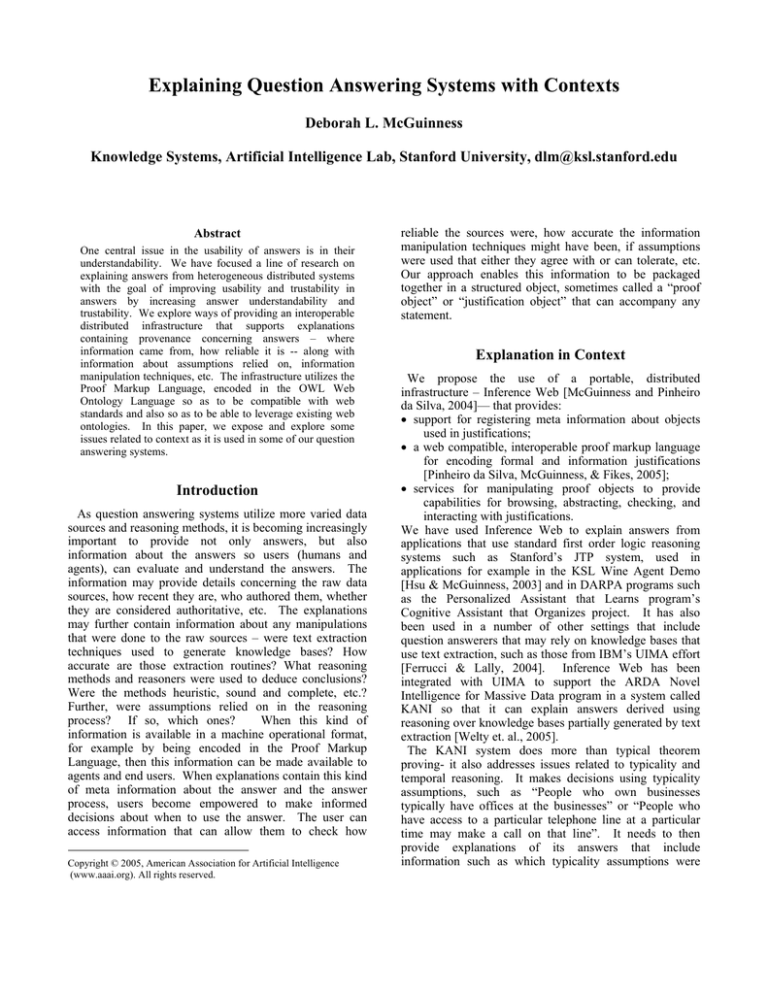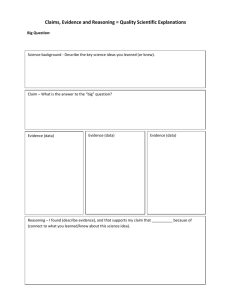
Explaining Question Answering Systems with Contexts
Deborah L. McGuinness
Knowledge Systems, Artificial Intelligence Lab, Stanford University, dlm@ksl.stanford.edu
Abstract
One central issue in the usability of answers is in their
understandability. We have focused a line of research on
explaining answers from heterogeneous distributed systems
with the goal of improving usability and trustability in
answers by increasing answer understandability and
trustability. We explore ways of providing an interoperable
distributed infrastructure that supports explanations
containing provenance concerning answers – where
information came from, how reliable it is -- along with
information about assumptions relied on, information
manipulation techniques, etc. The infrastructure utilizes the
Proof Markup Language, encoded in the OWL Web
Ontology Language so as to be compatible with web
standards and also so as to be able to leverage existing web
ontologies. In this paper, we expose and explore some
issues related to context as it is used in some of our question
answering systems.
Introduction
As question answering systems utilize more varied data
sources and reasoning methods, it is becoming increasingly
important to provide not only answers, but also
information about the answers so users (humans and
agents), can evaluate and understand the answers. The
information may provide details concerning the raw data
sources, how recent they are, who authored them, whether
they are considered authoritative, etc. The explanations
may further contain information about any manipulations
that were done to the raw sources – were text extraction
techniques used to generate knowledge bases? How
accurate are those extraction routines? What reasoning
methods and reasoners were used to deduce conclusions?
Were the methods heuristic, sound and complete, etc.?
Further, were assumptions relied on in the reasoning
process? If so, which ones?
When this kind of
information is available in a machine operational format,
for example by being encoded in the Proof Markup
Language, then this information can be made available to
agents and end users. When explanations contain this kind
of meta information about the answer and the answer
process, users become empowered to make informed
decisions about when to use the answer. The user can
access information that can allow them to check how
Copyright © 2005, American Association for Artificial Intelligence
(www.aaai.org). All rights reserved.
reliable the sources were, how accurate the information
manipulation techniques might have been, if assumptions
were used that either they agree with or can tolerate, etc.
Our approach enables this information to be packaged
together in a structured object, sometimes called a “proof
object” or “justification object” that can accompany any
statement.
Explanation in Context
We propose the use of a portable, distributed
infrastructure – Inference Web [McGuinness and Pinheiro
da Silva, 2004]— that provides:
• support for registering meta information about objects
used in justifications;
• a web compatible, interoperable proof markup language
for encoding formal and information justifications
[Pinheiro da Silva, McGuinness, & Fikes, 2005];
• services for manipulating proof objects to provide
capabilities for browsing, abstracting, checking, and
interacting with justifications.
We have used Inference Web to explain answers from
applications that use standard first order logic reasoning
systems such as Stanford’s JTP system, used in
applications for example in the KSL Wine Agent Demo
[Hsu & McGuinness, 2003] and in DARPA programs such
as the Personalized Assistant that Learns program’s
Cognitive Assistant that Organizes project. It has also
been used in a number of other settings that include
question answerers that may rely on knowledge bases that
use text extraction, such as those from IBM’s UIMA effort
[Ferrucci & Lally, 2004]. Inference Web has been
integrated with UIMA to support the ARDA Novel
Intelligence for Massive Data program in a system called
KANI so that it can explain answers derived using
reasoning over knowledge bases partially generated by text
extraction [Welty et. al., 2005].
The KANI system does more than typical theorem
proving- it also addresses issues related to typicality and
temporal reasoning. It makes decisions using typicality
assumptions, such as “People who own businesses
typically have offices at the businesses” or “People who
have access to a particular telephone line at a particular
time may make a call on that line”. It needs to then
provide explanations of its answers that include
information such as which typicality assumptions were
used in the reasoning path. Further, if there is any
information about the trust a user may have in the
assumptions (or the raw sources or the question answerers,
etc., this should also be exposed).
Our explanation infrastructure provides an extensible
format that has been adequate for encoding assumptions
required for the contextual reasoning required to date. It
has also been adequate for encoding the information
manipulation steps required to date. It can be viewed as a
prototype implementation of a design that supports
explanations of hybrid question answering systems that
require some support for context. The implementation
today in the KANI system does not integrate the trust
component [Zaihrayeu et. al., 2005] however a future
implementation will include this so that trust levels can be
included with explanations. Our interest in this workshop
is to gather input both on the existing explanation support
for our initial forms of limited context reasoning and to
gather additional requirements for explanation support for
future, more expansive applications.
Conclusion
Our thesis is that question answering systems may have
limited value if they can only answer questions but can not
provide explanations along with the answers. We have
provided an explanation infrastructure that supports
explanations in distributed heterogeneous question
answering environments, such as the web, where data
sources may have a wide diversity of quality, recency, and
reliability. Further, it supports explanations of question
answering environments that must take context into
account and provide forms on reasoning with context. Our
Inference Web framework is being used to support
question answering systems in a number of research
programs funded by DARPA and ARDA and has been
integrated with question answering systems that range
from theorem provers, to text analysis engines, to expert
systems, to special purpose temporal and context
reasoners.
References
David Ferrucci, 2004. Text Analysis as Formal Inference
for the Purposes of Uniform Tracing and Explanation
Generation. IBM Research Report RC23372.
David Ferrucci and Adam Lally, 2004. UIMA by Example.
IBM Systems Journal 43, No. 3, 455-475.
Eric Hsu, and Deborah L. McGuinness. KSL Wine Agent:
Semantic Web Testbed Application, Proceedings of the
2003 International Workshop on Description Logics
(DL2003). Rome, Italy, September 5-7, 2003.
www.ksl.stanford.edu/people/dlm/webont/wineAgent/
Deborah L. McGuinness, 1996. Explaining Reasoning in
Description Logics. Ph.D. Thesis, Rutgers University.
Technical Report LCSR-TR-277.
Deborah L. McGuinness and Paulo Pinheiro da Silva,
2004. Explaining Answers from the Semantic Web: The
Inference Web Approach. Journal of Web Semantics
1(4):397-413.
Paulo Pinheiro da Silva, Deborah L. McGuinness, and
Richard Fikes. A Proof Markup Language for Semantic
Web Services. Information Systems (to appear)
Paulo Pinheiro da Silva, Deborah L. McGuinness, and Rob
McCool, 2003. Knowledge Provenance Infrastructure. In
IEEE Data Engineering Bulletin 26(4), 26-32.
Ilya Zaihrayeu, Paulo Pinheiro da Silva, and Deborah L.
McGuinness, 2005. IWTrust: Improving User Trust in
Answers from the Web. Technical Report DIT-04-086,
Informatica e Telecomunicazione, University of Trento,
Italy
Christopher Welty, J. William Murdock, Paulo Pinheiro da
Silva, Deborah L. McGuinness, David Ferrucci, Richard
Fikes. Tracking Information Extraction from Intelligence
Documents. In Proceedings of the 2005 International
Conference on Intelligence Analysis (IA 2005), McLean,
VA, USA, 2-6 May, 2005.




